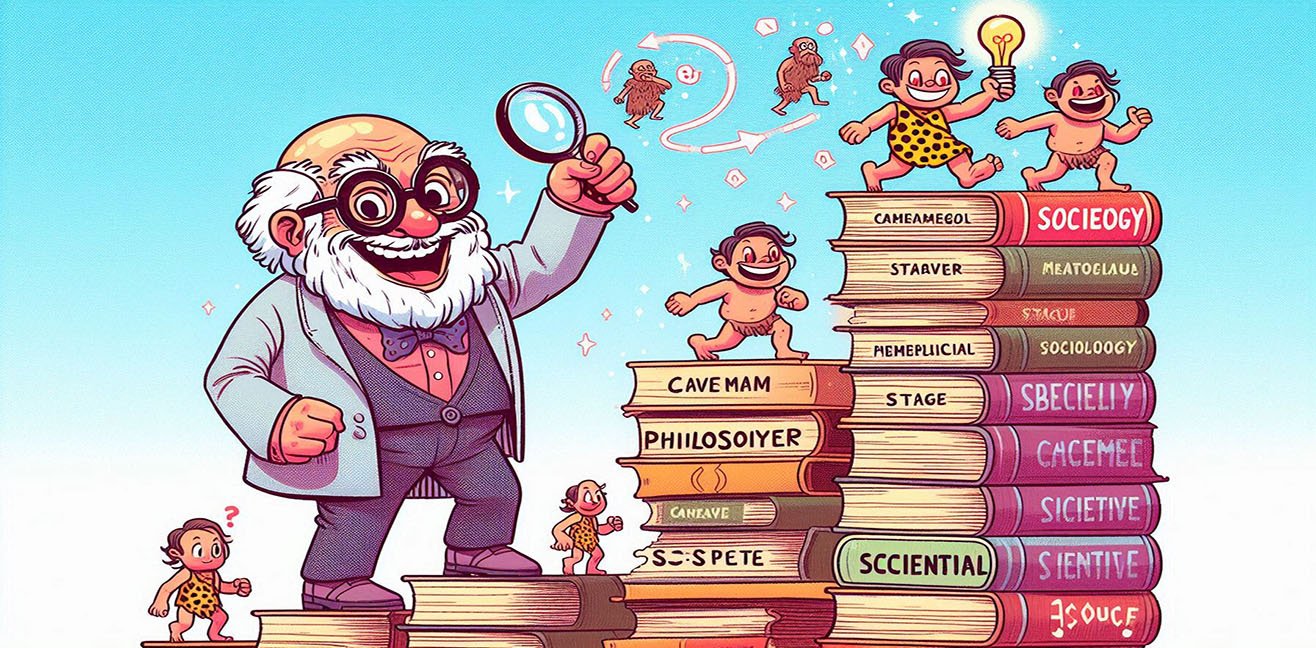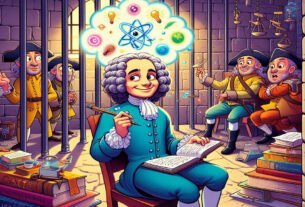Today, we’re embarking on a journey to the exciting, complex era of revolutions in the 19th century. 🚂 Our guide is none other than the founder of modern sociology, the prophet of positivism, the voice of reason, but also a passionate lover: Auguste Comte. 👨🔬📚
Childhood: The Birth of a Rebellious Genius 🎯
Born in 1798 in Montpellier, France, Comte came from a Catholic, monarchist conservative family. 🏰 But even in his high school years, he had raised the flag of rebellion by declaring, “I don’t believe in the Church or the king!” ✨ This initial break with his family marked the beginning of his lifelong “quest for order.”
While studying engineering at École Polytechnique, the idea began to form in his mind that “there should be social laws as certain as mathematical and physical laws.” 📊 However, due to disagreements with the school administration, he was expelled from this prestigious institution. 🚫 Perhaps this rejection would push him toward “building his own system” rather than pursuing “formal education.” 💡
Intellectual Transformation: The Stormy Collaboration with Saint-Simon 🌪️
Young Comte became the secretary of utopian socialist Henri de Saint-Simon. 👨💼 This was both an opportunity and a test for him. He learned about industrial society analysis and social reform ideas from Saint-Simon. 📈 But two strong personalities began to clash. Comte wanted to develop his own ideas. Finally, in 1824, they parted ways. Comte explained this separation as follows:
“I had to prove that I had original thoughts.” 💪
The Course on Positive Philosophy: The Birth of a Grand Project 🎓
In 1826, at just 28 years old, he began delivering his “Course on Positive Philosophy.” 🎤 These lectures would form the foundation of his six-volume magnum opus. However, during the lectures, he suffered a serious nervous breakdown and had to spend some time in a mental hospital. 🏥 This crisis became a turning point in both his personal and intellectual life.
Let’s examine the cornerstones of Comte’s positive philosophy: 🔍
The Law of Three Stages: The Intellectual Evolution of Humanity 📜
Comte proposed that human thought passes through three stages:
Theological Stage: ⛪
“The human mind should cease seeking the essence of phenomena and instead focus on discovering the real laws that govern them.”
This stage has three sub-phases:
- 🗿 Fetishism: Belief that natural objects are alive
- 🌩️ Polytheism: Explaining natural phenomena through gods
- ✝️ Monotheism: Belief that a single god rules the entire universe
Metaphysical Stage: 🧠
“Metaphysics is the necessary bridge from theology to positive science.”
In this stage, abstract concepts (nature, essence, spirit) replace gods.
Positive Stage: 🔬
“We must stop searching for absolutes and instead investigate the invariable relationships between observable phenomena.”
The Hierarchy of Sciences: The Building Blocks of the Pyramid 🔺
Comte ranked the sciences according to their complexity:
➕ Mathematics → 2. 🌌 Astronomy → 3. ⚛️ Physics → 4. 🧪 Chemistry → 5. 🧬 Biology → 6. 👥 SOCIOLOGY
It was no coincidence that sociology stood at the top of this hierarchy:
“Social physics is the most complex of all sciences.” 💫
The Two Fundamental Approaches of Sociology 🔄
Comte divided sociology into two main branches:
📊 Static: Examines the order and structure of society
“There can be no progress without order, and no order without progress.”
📈 Dynamic: Examines the change and evolution of society
“Progress is the development of order.”
The Religion of Humanity: The Synthesis of Mind and Heart 💞
In 1844, a dramatic transformation occurred in Comte’s life. He met a young woman named Clotilde de Vaux. 💑 This platonic love led to a radical change in his philosophy. Clotilde’s early death in 1846 deeply shook Comte: 😢
“Meeting her was the greatest happiness of my life; losing her is my greatest tragedy.”
After this experience, Comte founded the “Religion of Humanity.” This religion featured:
- ⛪ Temples: Positivist churches
- 🙏 Saints: Great heroes of humanity
- 🕯️ Rituals: Ceremonies emphasizing social solidarity
- 💫 Motto: “L’amour pour principe, l’ordre pour base, et le progrès pour but”
(Love as the principle, order as the basis, progress as the goal)
The Positive Catechism: Rules for Daily Life 📖
Comte also developed rules for everyday life:
🌍 Life motto: “To live for others”
💫 Moral understanding: “Live for a being superior to yourself”
👥 Social view: “All human beings are connected to each other”
Humor and Irony: The Hidden Side of a Serious Philosopher 😄
Beneath Comte’s serious exterior lay a subtle sense of humor. In a letter to a friend, he wrote:
“In my Religion of Humanity, I’m thinking of making mathematicians the priests and poets the assistant priests. At least our prayers will rhyme!” 📐✍️
And in his diary, he noted this interesting thought:
“Today I took myself too seriously again. Yet the universe keeps turning, completely unaware of my existence. What a humbling thought!” 🌍🤔
Excerpts from His Works 📚
From Course on Positive Philosophy: 🎓
“All of human history is a march from theological and military regimes toward positive and industrial regimes.” 🚶♂️→🏭
From System of Positive Polity: 🏛️
“Our mind teaches us the laws that govern the universe, our heart teaches us to live according to these laws.” 🧠💖
His Poetry: Rare but Meaningful ✍️
Comte wrote very few poems, but they reflect his emotional world:
“A drop am I in humanity’s sea, 🌊
Enlightened by reason’s light, 💡
Warmed by affection’s heat, ❤️
This tiny drop that merges with the ocean,
On the path to immortality.” 🛣️✨
Reflections in Modern Times 🔮
What does Comte tell us today? 🤔
📊 Evidence-based thinking: “What do the proofs say?”
🔍 Holistic perspective: “How do the parts form a whole?”
🤝 Ethical responsibility: “Scientists are responsible to society”
💖 The importance of emotion: “Reason alone is not enough”
We can find the philosophical foundations of modern “data science,” “evidence-based policy,” and even “big data” in Comte. 💻📈
Criticisms and Legacy ⚖️
Comte’s system was criticized for being too rigid and despotic. John Stuart Mill said of him, “His system leaves no room for freedom.” 🚫🗽 Yet nevertheless:
👥 He established sociology as a scientific discipline
🔗 He pioneered interdisciplinary approaches
🏗️ He sought scientific foundations for social reform
Final Words: 💫
Comte tells us: “To understand life, take science as your guide, but to be human, carry love in your heart.” 🔬❤️
Perhaps he was a bit utopian, perhaps a bit romantic, but he opened important doors for us to better understand the world. His legacy continues to live on in the work of sociologists, politicians, and scientists today. 🌍✨
Remember,: As Comte himself said, “Everything is relative, except this absolute truth.” 💫




